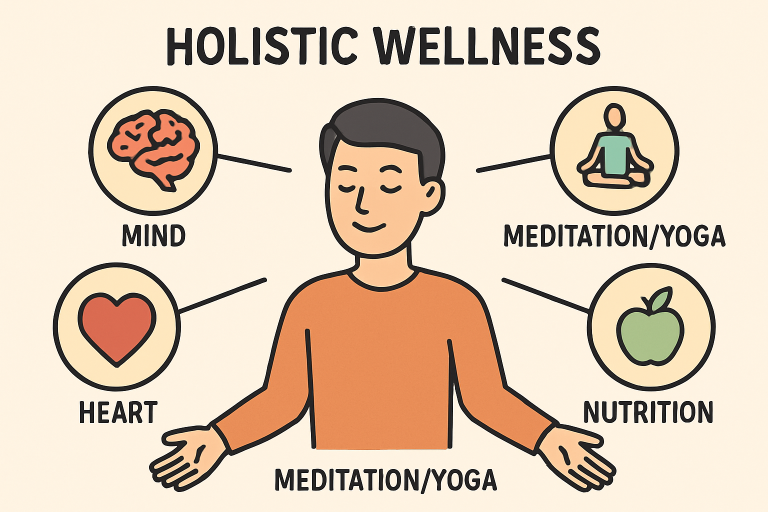In a society that constantly demands more of our time and energy, cultivating lasting health is becoming increasingly complex. Many people are discovering that traditional symptom-focused solutions only provide temporary relief. Lasting well-being flourishes when physical, mental, and emotional health are considered as a whole—an approach championed by holistic wellness practitioners. Discussing the integration of mind and body, a Functional Medicine Doctor Denver can guide individuals toward a well-rounded path to healing and long-term vitality. Holistic wellness is a comprehensive concept that encompasses health, encompassing physical strength, mental clarity, emotional stability, and spiritual connection, beyond merely the absence of disease. It emphasizes addressing the root causes of health issues, supported by practices such as mindfulness, yoga, and nutrition-focused living. This perspective encourages proactive and intentional lifestyle choices that foster resilience and longevity through consistent, minor adjustments.

Understanding Holistic Wellness
Holistic wellness is a philosophy that views the body, mind, and spirit as interconnected and inseparable. Rather than separating symptoms from their context, holistic approaches delve into underlying causes, whether they’re emotional stress, poor dietary choices, or unresolved trauma. This method often yields more comprehensive healing, as practitioners address the entirety of a person’s experience and environment. Harmony among body, mind, and spirit is essential for preventing illness, fostering resilience, and promoting lifelong well-being.
The Mind-Body Connection
Over generations, cultures worldwide have recognized the profound impact that emotional and mental states can have on the body. Scientific research now affirms this ancient understanding, illustrating how chronic stress, anxiety, and depression manifest as physical symptoms. Practices from Ayurveda and Traditional Chinese Medicine illustrate deep mind-body interdependence—highlighting, for instance, how emotional upset may contribute to digestive issues or chronic pain. Modern psychology and medicine echo these principles, encouraging patients to address mental health alongside physical symptoms for complete healing.
Practices for Integrating Mind and Body
Yoga and Movement
Yoga, tai chi, and qigong serve as a bridge between mindful awareness and physical well-being. By synchronizing movement with breath, individuals can reduce stress, enhance flexibility, and strengthen their immune function. Harvard Medical School outlines how mind-body exercises can ease symptoms of chronic illnesses while boosting mood and energy.
Meditation and Mindfulness
Regular meditation cultivates mental clarity, emotional resilience, and even improved cardiovascular health. Mindfulness practices can help break cycles of rumination and anxiety, empowering individuals to respond thoughtfully to life’s challenges rather than react impulsively.
Integrative Therapies
Acupuncture, massage, and other integrative therapies enhance the mind-body connection by calming the nervous system, alleviating pain, and facilitating emotional release. A personalized blend of these practices can help address both acute and chronic conditions.
Nutrition and Physical Health
Diet is a foundational element in holistic health. Whole, nutrient-dense foods fuel not only the body but also influence brain chemistry and mood. Unprocessed fruits, vegetables, lean proteins, nuts, and fermented foods contribute to stable energy, enhanced immune defense, and even decreased inflammation. Experts encourage reducing or eliminating highly processed foods and sugar, as these can disrupt gut health and contribute to chronic disease.
Mental Health and Stress Management
Emotional well-being is inextricably linked to physical health. Restorative sleep, engaging social connections, and structured daily routines are essential for reducing anxiety and preventing burnout. Mindfulness-based practices—including journaling and guided relaxation—enable individuals to transform stress, gain perspective, and foster self-compassion. Seeking professional support, whether through therapy or holistic counseling, can be pivotal for those struggling with persistent mental health challenges.
Creating a Personalized Wellness Plan
Everyone’s journey in holistic wellness is unique. Effective plans begin with an honest self-assessment to identify needs and areas for growth. Setting achievable goals, creating accountability—possibly with help from a functional medicine provider—and regularly reevaluating strategies ensure continued progress. Incorporating variety in nutrition, exercise, and emotional practices keeps wellness routines fresh and engaging. Listening to one’s body and respecting personal limits remain crucial throughout the process.
Conclusion
Integrating mind-body practices through holistic approaches lays the groundwork for resilience, fulfillment, and lasting health. By addressing both mental and physical well-being, individuals can break the cycle of symptom-focused care and move toward sustainable balance. Embracing a personalized, holistic path offers an empowering invitation to thrive at every stage of life.
Holistic Approaches to Wellness: Integrating Mind and Body for Lasting Health
Related posts
More Reads
Holistic Approaches to Wellness: Integrating Mind and Body for Lasting Health
In a society that constantly demands more of our time and energy, cultivating lasting health is becoming increasingly complex. Many…
Behind the Cable: Ever Wonder How Wireline Services Work? Tap to Explore the Process Step-by-Step
Introduction The oil and gas industry relies on wireline service for continuous well monitoring and intervention to maximize productivity and maintain safe…



